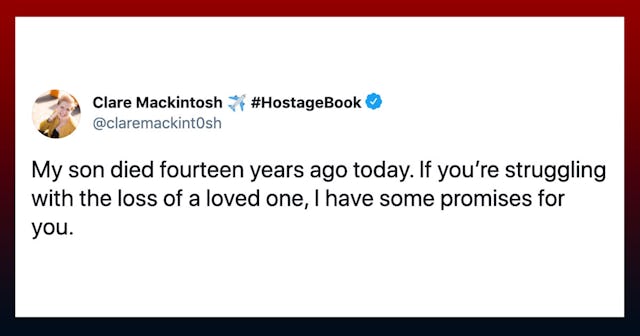This Author's Tweets About Grief Are Just What Many Of Us Need To Hear

As a writer and a mother, I know how much words matter. We teach our kids constantly how to express themselves in the healthy ways. What we don’t often remind ourselves, is how much we need to hear the words of others, especially when we are in need of hearing someone say, “I am here to help.” We must hear them and their words, let them soak into our being and understand them at face value. When we grieve, especially the loss of a child or loved one, or even of a life we once had, we must remember that we are not alone. Author Clare Mackintosh reminds us in her tweets that we are not alone in our grief and that it will pass, even if we don’t believe it at the moment.
Clare, pregnant with twin boys, gave birth to them 12 weeks early. Clare wrote about her birth experience and the days and week which followed in The Guardian in 2019. Clare shares more about her grief, writing, “We walked through the hospital grounds, numb with grief. I watched a woman and her partner carry twin babies to their car and felt a sudden rush of bitterness. Why us, not them? I blamed myself for letting the babies come early. We tried to list the arguments for each option, circling endlessly back to the same refrain. I can’t, I just can’t.”
Any pregnant person can tell you that nothing is promised and every step of the way, you hold your breath worried that something might go wrong. We might not say it out loud, but the feeling is there. Clare sharing her experience with her own experience of loss and love, opens us all up to acknowledge and sit with our own grief.
Grief can be all consuming, debilitating, and a lonely place to be. It can introduce us to emotions and feelings we never had before from anger to fear to loneliness. My mother died when I was 25 years old. We didn’t have the best of relationships, but I did grieve for her. And when the anniversary of her death arrives every year, I acknowledge whatever emotion rises up within me towards her. Most recently, it’s been anger. She’s been gone for almost fifteen years and yet those feelings of anger and hurt remain.
What Clare reminds us of is that this is okay. She encourages us to ride the waves of emotion because we will indeed get to the other side of it all.
We’ve all heard about the five stages of grief, stages that can be felt regardless of whom you’re mourning. While they are described as stages, with the assumption being that you’ll experience all of them at some point, for me, that has not been the case. The five stages are: denial, anger, bargaining, depression, and acceptance. If I dig deep into my bucket of emotions holding my feelings about my mother’s death, I’ve experienced all of these stages, but not in this order. And that is okay.
Why? Because the experience of grief is not one-size-fits-all. It is also okay not t0 have experienced any of these stages. Grief can take many different forms. I do not pretend to know what it feels like to have to bury your child. My grandmother has, since she buried my mother.
And thousands of other parents have and will continue to pick themselves up from the blows of being hit with news of their child’s death. There are tools we can pick up that can help us, and one that Clare chose is writing. As she shares in The Guardian, “Writing has always been my way of making sense of the world. Back then I was a police officer, not an author, but I found I had a burning need to write about what had happened. What if we’d made a different choice? What if Rob and I had disagreed? What if the doctors had been wrong? What if, what if, what if…”
You can write about your grief journey, you can join a support group like Grief Share, and you can read more about finding what works for you in Psychology Today. Whatever tools you pick up to add to your toolbox or the course you take on your own journey in grief, remember that you will make it to the other side. You are not alone — you never have been and never will be.
This article was originally published on